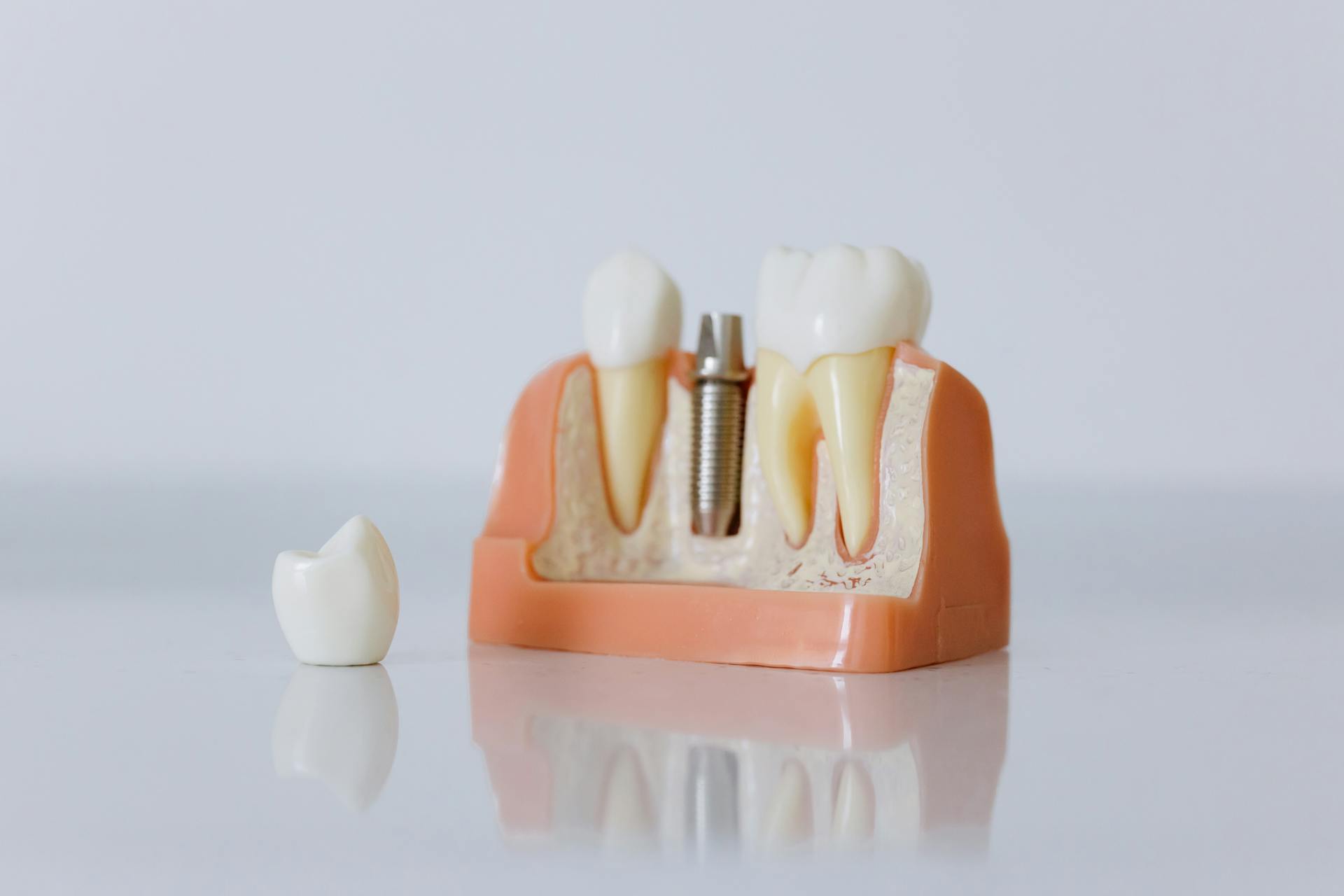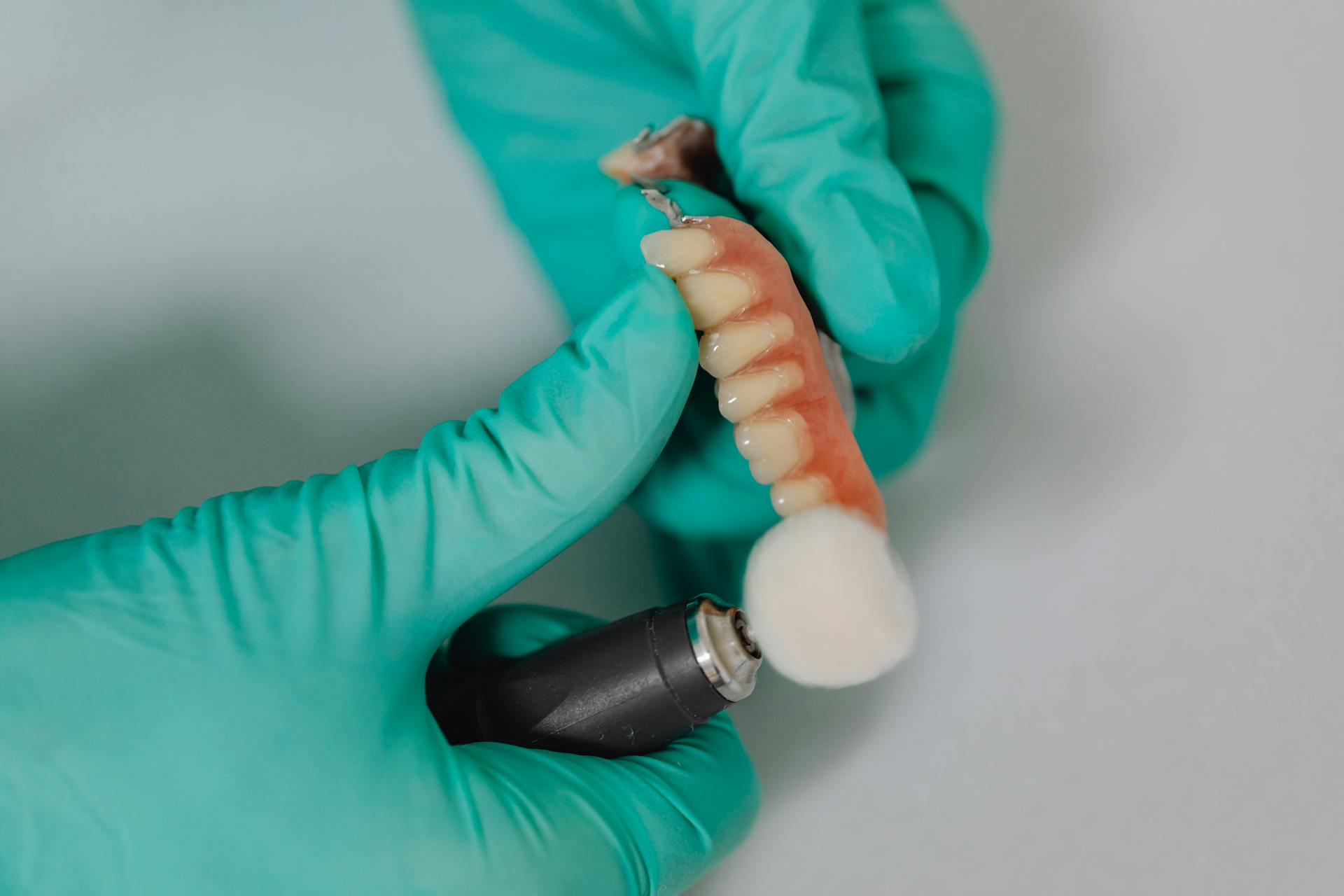
When someone loses a tooth, an implant is a great way to replace it. A dental implant is an artificial tooth root that is placed into your jaw to hold a replacement tooth or bridge. Dental implants are an ideal option for people in good general oral health who have lost a tooth or teeth due to periodontal disease, an injury, or some other reason.
The first thing your dentist will do is assess your individual case and decide whether or not you are a candidate for dental implants. Once it is determined that you are a good candidate, your dentist will refer you to an oral surgeon.
The oral surgeon will then take x-rays and, if necessary, a CT scan of your jawbone to determine the precise location for the implant. Once the location is determined, the oral surgeon will make a small incision in your gum tissue and place the implant into the bone.
After the implant is placed, the oral surgeon will close the incision with stitches. The implant will then be left to heal and integrate itself into the bone for a period of four to six months.
Once the implant has fused to the bone, your dentist will then attach a small connector post, called an abutment, to the top of the implant. Once the abutment is in place, your dentist will take an impression of your teeth and have a replacement tooth, called a crown, made.
The crown is then placed on top of the abutment and the entire assembly is cemented into place. The result is a replacement tooth that looks, feels, and functions just like your natural teeth!
If this caught your attention, see: Will Work for Recovery?
What is a tooth implant?
A tooth implant is a small titanium screw that serves as the replacement for the root of a missing tooth. The implant is placed in the jawbone where the missing tooth once was. As the jawbone heals, it grows around the implant, securing it in place. Once the implant has bonded to the jawbone, a small connector, called an abutment, is placed on top of the implant. The abutment is then used to support a replacement tooth, called a crown.
Implants are an ideal tooth replacement option for many reasons. First, they look and feel like natural teeth. Second, they are designed to last a lifetime. With proper care, your implant-supported teeth can last as long as your natural teeth. Third, implants can help preserve the health of your jawbone. When you lose a tooth, the bone that supported that tooth begins to deteriorate. This can lead to a change in the shape of your face and can make it difficult to wear dentures. Implants help to prevent this bone loss by providing stimulation to the bone.
fourth, implants can improve your chewing ability and your overall quality of life. When you lose teeth, it can be difficult to eat the foods you love. With implants, you can enjoy all of your favorite foods again.
If you are missing teeth and are considering tooth implants, it is important to consult with a qualified implant dentist to see if you are a candidate for this life-changing procedure.
Take a look at this: Teeth Small
How does a tooth implant work?
A tooth implant is a small metal post that is surgically placed into the jawbone beneath the gum line. Once the implant has bonded to the jawbone, a small connector called an abutment is placed on top of the implant. This abutment protrudes through the gum line and can be used to support a dental restoration, such as a crown, bridge or denture.
The implant itself is usually made of titanium, which is a biocompatible metal that is well tolerated by the body. The titanium metal fuses to the bone over time, a process known as osseointegration. This fusion of metal and bone provides a strong and stable foundation for the dental restoration.
The first step in getting a tooth implant is to have a consultation with a dentist or oral surgeon to see if you are a good candidate for the procedure. During this visit, the dentist will take x-rays and impressions of your teeth to develop a treatment plan.
If you are determined to be a good candidate for a tooth implant, the next step is to have the implant placed. This is done through a surgical procedure that takes place in a dental office or oral surgery center.
During the surgery, the gums are opened up to expose the bone. A small hole is then drilled into the bone and the implant is placed. Once the implant is in place, the gums are sutured closed.
After the surgery, it is important to practice good oral hygiene and care for the implant site as you would any other wound. It is also important to eat soft foods and avoid chewing on the implant site for the first few weeks as it heals.
The final step in the process is to have the dental restoration placed on top of the abutment. This can be done a few months after the implant surgery, once the implant has had time to fuse to the bone.
The type of dental restoration that is placed on top of the implant will depend on the location of the implant and the number of teeth that are missing. A crown, bridge or denture can be used.
A tooth implant is a small metal post that is surgically placed into the jawbone beneath the gum line. Once the implant has bonded to the jawbone, a small connector called an abutment is placed on top of the implant. This abutment protrudes through the gum line and can be used to support
Suggestion: Dental Implant Work
What are the benefits of a tooth implant?
A tooth implant is a great way to replace a missing tooth or teeth. They look and feel just like your own teeth! There are many benefits of tooth implants, including:
1. Improved Appearance: Dental implants look and feel like your own teeth! They are designed to match your natural tooth color and shape, and blend in seamlessly with your smile.
2. Improved Speech: Because dental implants are securely anchored in your jawbone, they allow you to speak confidently and without worry that your teeth will slip or shift. This can be a major advantage for those who have previously had difficulty speaking clearly due to missing teeth.
3. Improved Oral Health: Unlike dentures or bridges, dental implants do not rely on neighboring teeth for support. This means that there is no risk of tooth decay or gum disease affecting the adjacent teeth. In addition, because dental implants are so tightly secured in your jawbone, they actually help to stimulate and preserve bone density, which can lead to overall improved oral health.
4. Improved Quality of Life: Dental implants allow you to eat, speak, and smile with confidence. They provide a level of independence and freedom that is unmatched by other tooth replacement options. With dental implants, you can once again enjoy all of your favorite foods without worry or embarrassment.
5. Durability: Dental implants are designed to last a lifetime! With proper care, your implants can provide you with many years of natural-looking, functional smiles.
If you are considering tooth replacement options, be sure to ask your dentist about dental implants. They may be the perfect solution for you!
Broaden your view: Feel Working
How long does a tooth implant last?
How long does a tooth implant last? This is a question that dental implant patients often ask their dentists. The answer, however, is not always simple. Just like with any other medical procedure, the success of dental implants depends on a number of factors, including the patient's overall health, the quality of the dental implant, and the skill of the dental implant surgeon. With that said, however, most dental implants are designed to last a lifetime.
The first thing to understand is that a dental implant is not just a replacement for a missing tooth. It is actually a replacement for the entire root structure of a tooth. The implant is placed into the jawbone, and over time, it fuses with the bone. This process, called osseointegration, is essential for the long-term success of the dental implant.
Once the implant has fused with the jawbone, it becomes a strong and stable foundation for a dental prosthetic. The prosthetic can be a crown, a bridge, or even a set of dentures. In most cases, the prosthetic is made from porcelain, which is a very strong and lifelike material.
As long as the implant remains fused to the jawbone, it will continue to support the prosthetic. However, there are a few things that can affect the long-term success of dental implants. First, if the patient does not practice good oral hygiene, the implant can become infected. This is why it is so important for dental implant patients to brush and floss their teeth regularly and to see their dentists for regular checkups and cleanings.
Second, if the patient experiences bone loss in the jaw, it can affect the dental implant. This is why it is important for dental implant patients to maintain good overall health and to avoid smoking and other habits that can cause bone loss.
Third, if the patient has a history of gum disease, this can also affect the long-term success of dental implants. Gum disease can weaken the bone around the implant and make it more likely to fail.
Fourth, if the patient experiences a traumatic injury to the mouth, this can also affect the long-term success of dental implants. Trauma can cause the implant to become loose, and it can also damage the surrounding teeth.
Overall, dental implants are a very successful way to replace missing teeth. However, as with any other medical procedure, the
Consider reading: How Long Do Teeth Last?
How much does a tooth implant cost?
The short answer is that a tooth implant can cost anywhere from $1,000 to $3,000. However, the long answer is a bit more complicated.
There are a few factors that will affect the cost of a tooth implant, including the type of implant, the dentist or oral surgeon performing the procedure, the location of the implant, and whether or not the patient has dental insurance.
The type of implant is one of the biggest factors in cost. There are two main types of implants: endosteal and subperiosteal. Endosteal implants are the most common and are placed directly into the jawbone. Subperiosteal implants are placed under the gum but on top of the jawbone. They are used for patients who have a thin jawbone or who cannot have surgery to place an endosteal implant.
The dentist or oral surgeon performing the procedure is another factor that can affect cost. Dentists who have more experience with implants or who specialize in implant surgery may charge more than those who do not. Additionally, the location of the implant can also affect cost. Implants placed in the front of the mouth tend to be less expensive than those placed in the back.
Finally, whether or not the patient has dental insurance can also play a role in cost. Dental insurance typically does not cover the cost of implants, but it may cover some of the related costs, such as the consultation, X-rays, or the removal of the tooth that is being replaced.
In general, patients can expect to pay anywhere from $1,000 to $3,000 for a tooth implant. However, the actual cost will vary based on the factors mentioned above.
Curious to learn more? Check out: Dental Implant
Is a tooth implant painful?
A tooth implant is a small titanium post that is inserted into the jawbone to serve as a new root for a missing tooth. The implant is then fitted with a replacement tooth (called a crown). Tooth implants are considered to be a major advance in dentistry because they offer a more natural-looking and longer-lasting solution to tooth loss than older methods, such as dentures.
Tooth implants are usually placed under local anesthesia, which numbs the area around the implant site. Some people may also be given a sedative to help them relax during the procedure. The implant itself is usually not painful, although there may be some discomfort during and after the surgery.
After the implant is inserted, the area around it will be sore and swollen for a few days. These symptoms can be alleviated with pain medication. It usually takes a few months for the implant to fully integrate into the jawbone. Once this process is complete, the replacement tooth can be attached to the implant.
Overall, tooth implants are a very effective and durable solution to tooth loss. They are also generally considered to be quite safe. However, as with any surgery, there are some risks involved. These include infection, damage to the surrounding teeth, and nerve damage.
If you are considering getting a tooth implant, it is important to talk to your dentist to see if this is the right option for you.
What is the recovery time for a tooth implant?
A tooth implant is a small titanium post that is placed into the jawbone to serve as a replacement for a missing tooth. The implant is then capped with a replacement tooth (called a crown). The advantage of an implant over a traditional bridge is that the implant does not rely on neighboring teeth for support.
The recovery time for a tooth implant varies from patient to patient, but is typically around 6-8 weeks. During this time, it is important to avoid putting any unnecessary pressure or stress on the implant site. This means avoiding chewing on hard foods, gum, or ice. It is also important to brush and floss carefully around the implant site.
After the initial recovery period, the implant should be as strong as a natural tooth and can be cared for in the same way. With proper care, an implant can last a lifetime.
What are the risks of a tooth implant?
There are many risks associated with tooth implants, including infection, damage to the surrounding teeth, nerve damage, and sinus problems. Infection is the most common complication associated with tooth implants, and can occur at the site of the implant or in the surrounding tissue. Damage to the surrounding teeth can occur if the implant is not placed properly, and nerve damage can occur if the implant touches the nerves in the jawbone. Sinus problems can occur if the implant extends into the sinus cavity.
Can a tooth implant be removed?
A tooth implant is a titanium post that is surgically placed into the jawbone to serve as a tooth root. A tooth implant can be removed, but it is a major surgery that should only be done by an experienced oral surgeon. The surgeon will make an incision in the gum tissue and then remove the implant by breaking it away from the bone. The whole process can take up to two hours and may require a hospital stay.
Frequently Asked Questions
What are the benefits of replacing a tooth with a dental implant?
A dental implant represents a significant improvement in quality of life for many patients. Patients who have dental implants generally report feeling more confident and happier without teeth in their mouths and often find that they no longer experience pain from TMJ or other tooth related problems. In addition, dental implant patients are often able to eat virtually anything without discomfort and enjoy greater oral hygiene standards since they can brush and floss their teeth with ease. Dental implant surgery is relatively painless and most people recover quickly from the procedure. What are the risks of replacing a tooth with a dental implant? There are a few possible risks associated with dental implant surgery. The biggest risk is that the implant may not be able to properly support the weight of a complete tooth subsequently placed on it, leading to severe bone damage or even loss of the implant. In addition, if the abutment becomes loose or if the screw that attaches it to the implant becomes unscrewed, there is a risk that the implant
What is a crown on a dental implant?
A crown is a type of artificial tooth that is placed on an extension of the post (abutment) on the dental implant, giving you the look of a real tooth.
What is a dental implant procedure?
A dental implant procedure is performed by inserting artificial tooth roots. These implants bond with your jawbone, allowing the dentist or oral surgeon to place replacement teeth called crowns. Dental implants can be an option if you have one or more missing permanent teeth. They’re made to look, feel, and function like your natural teeth.
What are the benefits of a dental implant?
The benefits of dental implants include: -Attractive, long-lasting results -Reliability and stability -No contacts with saliva or bacteria -Affordable
Are dental implants available today?
Yes, dental implants are available now.
Sources
- http://nefamilydentist.com/how-does-a-dental-implant-work/
- https://bafdentistry.com/blogs/news/how-do-dental-implants-work-and-how-are-they-made
- https://www.arnicadentalcare.co.uk/dental-implants/how-dental-implants-work/
- https://www.dentalimplantsusa.com/how-do-dental-implants-work/
- https://www.fda.gov/medical-devices/dental-devices/dental-implants-what-you-should-know
- https://sfdental.com.au/what-are-dental-implants/
- https://journomed.com/dental-implant-what-do-you-need-to-know/
- https://www.authoritydental.org/dental-implant-pain
- https://wikialpha.org/wiki/How_Painful_is_Dental_Implant_Surgery%3F
- https://www.quora.com/How-painful-is-a-front-tooth-implant-procedure
- https://www.beverlyhillsladentist.com/blog/how-long-does-it-take-to-recover-from-dental-implants/
- https://www.okcsmiles.com/what-is-the-recovery-time-for-a-dental-implant/
- https://sforalsurgery.com/ultimate-guide-dental-implant-surgery-recovery/
- https://www.aarp.org/health/conditions-treatments/info-2020/dental-implants-danger.html
- https://southlanddentalcare.com/are-dental-implants-safe/
Featured Images: pexels.com


